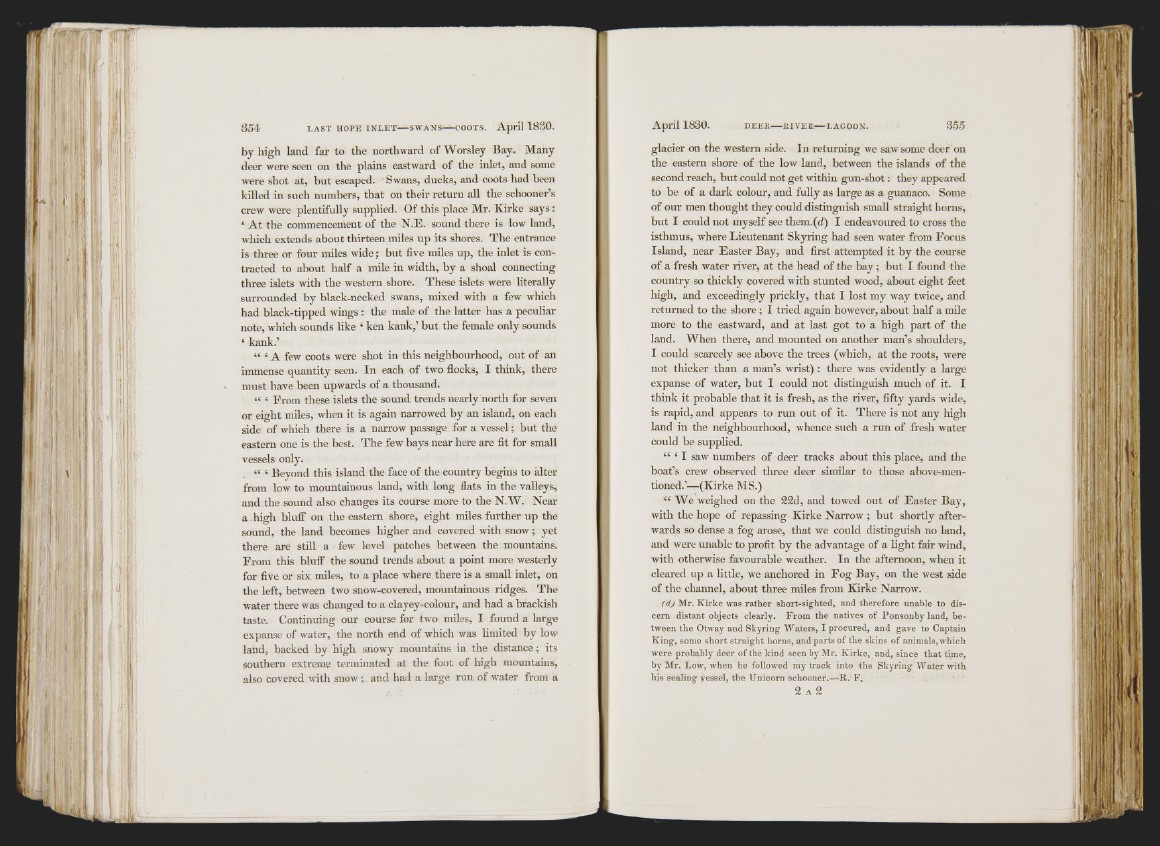
- n ' i T
C- s‘ C i l
by high land far to the northward of Worsley Bay. Many
deer were seen on the plains eastward of the inlet, and some
were shot at, but escaped. Swans, ducks, and coots had been
killed in such numbers, that on their return all the schooner’s
crew were plentifully supplied. Of this place Mr. Kirke says;
‘ At the commencement of the N.E. sound there is low land,
which extends about thirteen miles up its shores. The entrance
is three or four miles wide; but five miles up, the inlet is contracted
to about half a mile in width, by a shoal connecting
three islets with the western shore. These islets were literally
surrounded by black-necked swans, mixed with a few which
had black-tipped wings : the male of the latter has a peculiar
note, which sounds like ‘ ken kank,’ but the female only sounds
‘ kank.’
“ ‘ A few coots were shot in this neighbourhood, out of an
immense quantity seen. In each of two flocks, I think, there
must have been upwards of a thousand.
“ ‘ From these islets the sound trends nearly north for seven
or eight miles, when it is again narrowed by an island, on each
side of which there is a narrow passage for a vessel; but the
eastern one is the best. The few bays near here are fit for small
vessels only.
“ ‘ Beyond this island the face of the country begins to alter
from low to mountainous land, with long flats in the vaUeys,
and the sound also changes its course more to the N.W. Near
a high bluff on the eastern shore, eight miles further up the
sound, the land becomes higher and covered with snow; yet
there are still a few level patches between the mountains.
From this bluff the sound trends about a point more westerly
for five or six miles, to a place where there is a small inlet, on
the left, between two snow-covered, mountainous ridges. The
water there was changed to a clayey-colour, and had a brackish
taste. Continuing our course for two miles, I found a large
expanse of water, the north end of which was limited by low
land, hacked by high snowy mountains in the distance; its
southern extreme terminated at the foot of high mountains,
also covered with snow ; and had a large run of water from a
glacier on the western side. In returning we saw some deer on
the eastern shore of the low land, between the islands of thé
second reach, but could not get within gun-shot : they appeared
to be of a dark colour, and fully as large as a guanaco. Some
of our men thought they could distinguish small straight horns,
but I could not myself see them, (d) I endeavoured to cross the
isthmus, where Lieutenant Skyring had seen water from Focus
Island, near Easter Bay, and first attempted it by the course
of a fresh water river, at thé head of the bay ; but I found the
country so thickly covered with stunted wood, about eight feet
high, and exceedingly prickly, that I lost my way twice, and
returned to the shore ; I tried again however, about half a mile
more to the eastward, and at last got to a high part of the
land. When there, and mounted on another man’s shoulders,
I could scarcely see above the trees (which, at the roots, were
not thicker than a man’s wrist) : there was evidently a large
expanse of water, but I could not distinguish much of it. I
think it probable that it is fresh, as the river, fifty yards wide,
is rapid, and appears to run out of it. There is not any high
land in the neighbourhood, whence such a run of fresh water
could he supplied.
“ ‘ I saw numbers of deer tracks about this place, and the
boat’s crew observed three deer similai- to those above-mentioned.’—(
Kirke MS.)
“ We weighed on the 22d, and towed out of Easter Bay,
with the hope of repassing Kirke Narrow ; but shortly afterwards
so dense a fog arose, that we could distinguish no land,
and were unable to profit by the advantage of a hght fair wind,
with otherwise favourable weather. In the afternoon, when it
cleared up a little, we anchored in Fog Bay, on the west side
of the channel, about three miles from Kirke Narrow.
rdf Mr. Kirke was ra th e r short-sig'hted, and therefore unable to discern
distant objects clearly. From the natives of Ponsonby land, between
the Otway and Skyring Waters, I procured, and gave to Captain
King, some short stra ig h t horns, and parts o f the skins o f animals, which
were probably deer of the kind seen by M r. K irk e , and, since th a t time,
by Mr. Low, when he followed my tra ck into the Skyring W ater with
his sealing vessel, the Unicorn schooner.—R. F.
2 a 2
fif'
I )
M